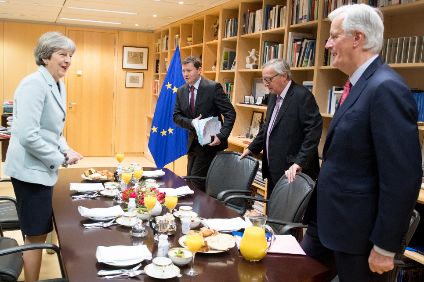
Besides the ongoing complex politics surrounding a proposed UK-EU exit agreement to include UK-EU trade arrangements when the UK leaves the European Union (still officially scheduled for March 29), concerns are mounting in the UK business sector over arrangements for the ‘rollover’ of EU free trade deals currently in place with countries around the world. The hope has been that these EU free trade deals could be ‘rolled over’ and still apply to the UK during a proposed transition period.
However, the Financial Times reports that a confidential briefing by government to business representatives heard that the UK government said it cannot guarantee the British economy will be covered by “most” of the EU’s global network of trade agreements immediately after Brexit.

Discover B2B Marketing That Performs
Combine business intelligence and editorial excellence to reach engaged professionals across 36 leading media platforms.
The report said the UK’s Department of International Trade reported in the meeting that while trade agreements with Switzerland, Israel and some African nations would be wrapped up before Brexit, there was no certainty that other deals Brussels has with countries around with the world – including with big trade partners such as South Korea, Turkey and Canada – could be rolled over or duplicated in time.
The FT report noted that the EU has 40 preferential trade agreements covering 71 countries, which the UK needs to rollover whether or not it concludes a withdrawal deal with Brussels.
The report also said that participants at the briefing have expressed their frustration at the UK government’s approach, saying it is irresponsible not to provide a definitive list of countries with which the UK had failed to make an agreement – and that the meeting’s confidential status meant they could not warn industrial colleagues.
The UK has argued that provisions in its draft withdrawal agreement with the EU say that Britain should continue to enjoy the benefits as well as the obligations of EU trade deals with third parties during the post-Brexit transition period. The EU has also said that Britain should continue to be treated as if it is still an EU member state during the transition period (to the end of 2021 in the current draft agreement). However, non-EU countries have to agree to the approach.
Car manufacturers are among those said to be alarmed at the potentially adverse implications for UK trade through the loss of EU preferential trade agreements applying to the UK with respect to third countries. A ‘no-deal’ Brexit would likely reinforce the need for bilateral agreements to be in place as soon as the UK officially leaves the EU.
The UK government says it has already struck bilateral agreements with a number of countries including Chile, Switzerland, the Faroe Islands, Australia and New Zealand, with more to follow.
At a recent media briefing in London, SMMT chief executive Mike Hawes pointed out that the UK auto industry benefits from many preferential EU trade agreements and that these together represent areas around the world that account for 15.7% of UK car exports. When added to the EU27 share of UK car exports of 52.7% (in 2018, that amounted to 650,600 units), it says a ‘no-deal’ scenario could put more than two thirds of the UK auto industry’s global export trade at risk.
“We really need a deal and one of the consequences of no-deal is that EU free trade agreements we currently benefit from could be lost,” Hawes said. “If we resort to WTO rules by default in a no-deal scenario, new tariffs apply and it could be very damaging indeed for the UK’s automotive sector which operates in very competitive conditions globally.”
However, he also said that an orderly UK exit from the EU under an agreement with the EU would be a positive development that could lead to held-off investments coming on stream. “The continued logjam in Westminster and ongoing uncertainty at this late stage creates a lack of clarity for companies that is clearly deterring investment in an industry that is fundamentally very strong,” he said. “An agreed exit deal would provide some certainty going forward.”






